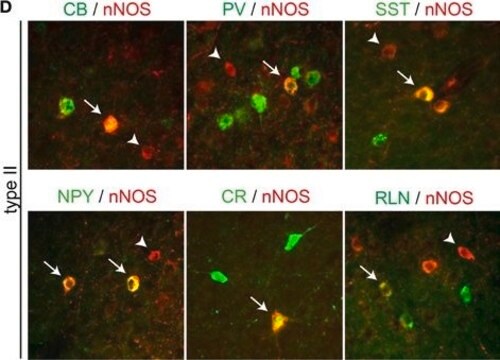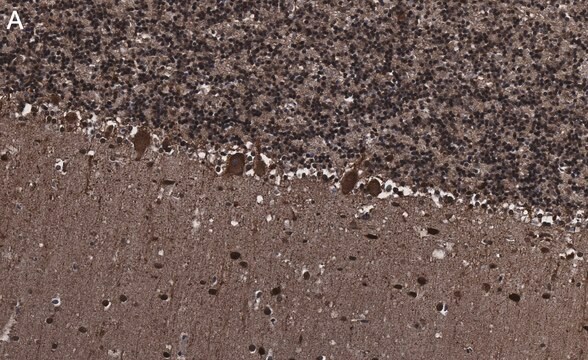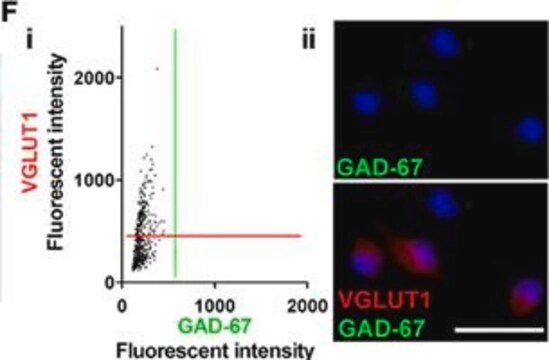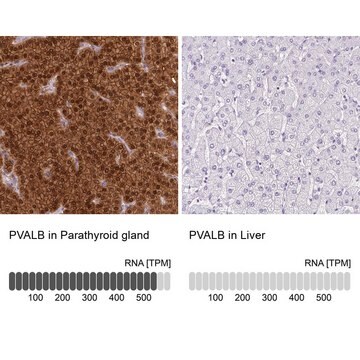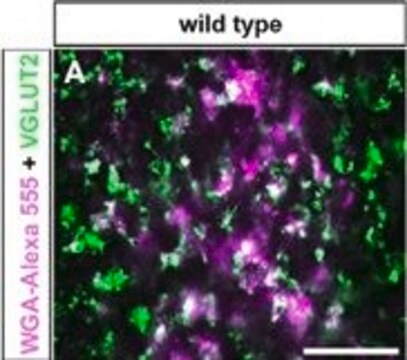AB15736
Anti-Parvalbumin Antibody
CHEMICON®, rabbit polyclonal
Sign Into View Organizational & Contract Pricing
All Photos(1)
About This Item
UNSPSC Code:
12352203
eCl@ss:
32160702
NACRES:
NA.41
clone:
polyclonal
application:
IHC
species reactivity:
human
technique(s):
immunohistochemistry: suitable (paraffin)
citations:
12
Recommended Products
Product Name
Anti-Parvalbumin Antibody, serum, Chemicon®
biological source
rabbit
Quality Level
antibody form
serum
antibody product type
primary antibodies
clone
polyclonal
species reactivity
human
manufacturer/tradename
Chemicon®
technique(s)
immunohistochemistry: suitable (paraffin)
NCBI accession no.
UniProt accession no.
shipped in
wet ice
target post-translational modification
unmodified
Gene Information
human ... PVALB(5816)
Specificity
Parvalbumin. Immunoreactivity is seen primarily in Purkinje cells. Immunostaining is completely eliminated when the antibody is incubated with the immunogen peptide prior to staining.
Immunogen
Synthetic peptide.
Application
Immunohistochemistry: 1:100 on paraffin embedded, 10% neutral Buffered Formalin fixed human cerebellum tissue. Suggested pretreatment is HIER (Heat Induced Epitope Retrieval) using Citrate buffer, pH 6.0. Detection system was the IHC-Select HRP-DAB system.
Research Category
Neuroscience
Neuroscience
Research Sub Category
Signaling Neuroscience
Signaling Neuroscience
This Anti-Parvalbumin Antibody is validated for use in IH(P) for the detection of Parvalbumin.
Linkage
Replaces: AB9312
Physical form
Liquid.
Serum
Storage and Stability
1 year at -20°C from date of shipment
Legal Information
CHEMICON is a registered trademark of Merck KGaA, Darmstadt, Germany
Disclaimer
Unless otherwise stated in our catalog or other company documentation accompanying the product(s), our products are intended for research use only and are not to be used for any other purpose, which includes but is not limited to, unauthorized commercial uses, in vitro diagnostic uses, ex vivo or in vivo therapeutic uses or any type of consumption or application to humans or animals.
Not finding the right product?
Try our Product Selector Tool.
recommended
Product No.
Description
Pricing
Storage Class Code
10 - Combustible liquids
WGK
WGK 1
Flash Point(F)
Not applicable
Flash Point(C)
Not applicable
Certificates of Analysis (COA)
Search for Certificates of Analysis (COA) by entering the products Lot/Batch Number. Lot and Batch Numbers can be found on a product’s label following the words ‘Lot’ or ‘Batch’.
Already Own This Product?
Find documentation for the products that you have recently purchased in the Document Library.
Young-Ki Jeon et al.
Neuroreport, 18(11), 1095-1099 (2007-06-26)
The purpose of this investigation is to characterize parvalbumin-immunoreactive (PV-IR) amacrine cells in bat retina through immunocytochemistry, quantitative analysis, and confocal microscopy. PV immunoreactivity was present in ganglion cell and inner nuclear layers. The regular distribution of PV-IR neurons, the
Pedro Royero et al.
Cell reports, 41(10), 111757-111757 (2022-12-09)
Maintaining an appropriate balance between excitation and inhibition is critical for neuronal information processing. Cortical neurons can cell-autonomously adjust the inhibition they receive to individual levels of excitatory input, but the underlying mechanisms are unclear. We describe that Ste20-like kinase
Immunohistochemical localization of calbindin D28-k, parvalbumin, and calretinin in the cerebellar cortex of the circling mouse.
Maskey D, Pradhan J, Kim HJ, Park KS, Ahn SC, Kim MJ
Neuroscience Letters null
Eva Martínez-Pinilla et al.
Annals of the New York Academy of Sciences, 1475(1), 34-42 (2020-07-01)
The cannabinoid CB1 receptor (CB1 R) is the most abundant G protein-coupled receptor in the central nervous system, consistent with the important role of endocannabinoids as neuromodulators. Cannabinoids also modulate the function of G protein-coupled receptor 55 (GPR55), which forms
Neuroprotective effect of ginseng against alteration of calcium binding proteins immunoreactivity in the mice hippocampus after radiofrequency exposure.
Maskey, D; Lee, JK; Kim, HR; Kim, HG
BioMed Research International null
Our team of scientists has experience in all areas of research including Life Science, Material Science, Chemical Synthesis, Chromatography, Analytical and many others.
Contact Technical Service